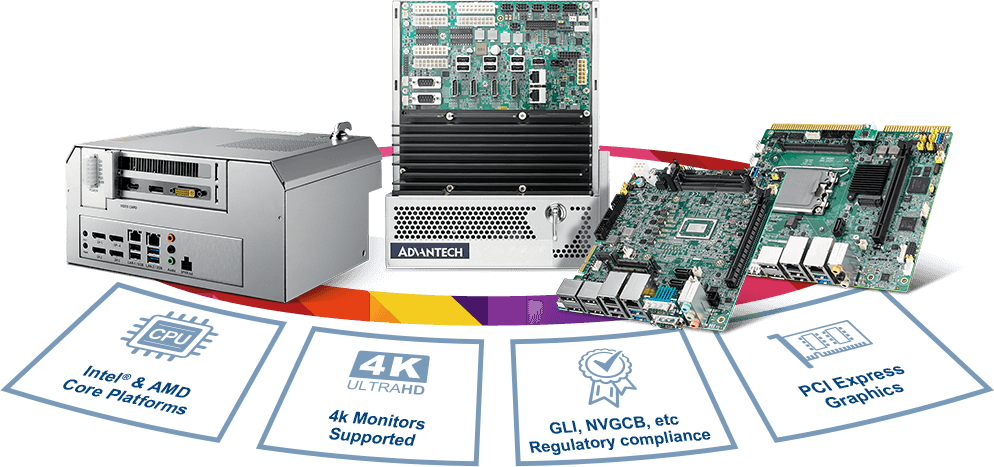How Advantech is bringing AI to the land-based gaming sector

Artificial intelligence (AI) is undeniably the in-vogue trend in the gambling industry. Much has been written about how AI can drive growth and profitability for online gaming.
Personalisation in particular has emerged as a lucrative area where online casinos are leveraging AI, with operators using the technology to intelligently tailor the gameplay experience to their customers.
Given its digital nature and the wealth of data touchpoints associated with online gambling, it is understandable that industry decision-makers have so far focused on igaming, rather than land-based gaming, as a more natural home for AI-driven technologies.
However, despite a relative lack of discussion on the topic, AI presents opportunities to improve gameplay, personalisation and ultimately margin for land-based operators too, says Craig Stapleton, the Product Director for Advantech’s Gaming Solutions division.
This is particularly important in the context of shifting demographics on the casino floor, with the average age of casino players trending younger. The Twilio 2024 State of Customer Engagement Report found that younger customers in particular spend more money with brands that personalise engagement, peaking with two-thirds of Gen Z consumers who adopt such an approach, followed by millennials in second place.
The American Gaming Association revealed last year that the average age of casino visitors had nosedived from 50 to 42 in the space of just five years.
Future-proofing retail gaming
It is therefore beyond doubt that AI technologies will disrupt retail gaming substantially in the years to come – and bricks-and-mortar establishments need to embrace the opportunity before it is too late.
Despite the sharp growth of online gambling, land-based gaming still accounted for the bulk of the US gambling market last year. Commercial and tribal casinos represented 56% of the total $172 billion (£131 billion/€155 billion) in gambling spend in the US in 2024 and 61% of gross gaming revenue, according to a report by Eilers & Krejcik Gaming.
However, given the trajectories of the different gambling verticals, the status quo will not last. While the mobile betting, icasino and ilottery verticals experienced double-digit expansions in the US from 2023 to 2024, growth in the commercial and tribal casino space has stagnated, with the segment expanding by just over 1% year-on-year.
New approaches and experiences, underpinned by new technologies, are required by the sector’s proactive operators to accelerate growth and ensure future financial sustainability – and it is inevitable that AI and data-driven personalisation will be vital.
AI in land-based gaming
Advantech, which is based in Taiwan and supplies gaming hardware companies globally, is one technology provider that is forging a path forward for AI in land-based gaming. As a supplier of embedded computing solutions, Advantech’s dedicated Gaming Solutions division designs and manufactures hardware and software for gaming devices.
“We believe that, like most other vertical markets, AI has the potential to add significant value to the land-based gaming sector,” Stapleton says.
“It’s more about discovering how best to apply the technology. In the context of land-based gaming, which primarily focuses on delivering player experiences, AI can – and is – being used to enhance that experience by observing and monitoring player behaviours to optimise operations and improve security measures.”
“Like most other vertical markets, AI has the potential to add significant value to the land-based gaming sector”
AI leverages vast amounts of data, helping to make the retail gaming experience more relevant and engaging for the customer.
By analysing gameplay data and studying the behaviour of individual players, AI can provide customers with specific game recommendations tailored to their preferences to optimise retention and enhance the player experience. These customised offerings could be based on factors ranging from game themes to in-game features and amounts wagered – and much more.
“AI can be used to mine behavioural data and gain a deeper understanding of what content resonates with players and how they engage or respond to it,” Stapleton adds. “This data can also assist operators in promoting responsible gaming by analysing player behaviours, identifying patterns or signs of problematic behaviour and prompting timely intervention from onsite teams.
“AI toolkits can also streamline and monitor machine maintenance by automating routine tasks and identifying suspicious behaviour, reducing both labour costs and mitigating operational risks.”
Built-for-AI gaming hardware
Advantech says it is already leveraging AI in its hardware and software solutions for the gaming industry.
The business’ primary offering to the gaming market is its DPX series of platforms, which are designed to meet the requirements of gaming applications including slot machines, sports betting, lottery kiosks and terminals.
But because artificial intelligence is a rapidly evolving field, and AI in a land-based context is still nascent, products also need to be built with future use cases in mind.
“Our DPX platforms are designed with future-proof architectures that allow seamless integration of AI applications, ensuring that operators can leverage AI without requiring major hardware overhauls,” Stapleton adds.
“Advantech’s DPX products are designed to support both current and future gaming requirements. We work closely with our technology partners, staying aligned with their developments and roadmaps to ensure that our offerings meet the evolving needs of operators and customers in the field. Our platforms provide the necessary infrastructure to support AI and other advanced applications, allowing us to serve as a gateway or facilitator of innovation.”
Advantech’s product features provide the entire hardware CPU platform for a typical slot machine application in a single product, Stapleton says.The company also offers a range of graphics cards that can be added to the scalable DPX-S series of platforms, enabling almost any level of GPU (graphics processing unit) and AI computing power to be introduced to the platform.

Challenges to AI in land-based gaming
One of the biggest challenges to implementing AI effectively in the land-based sector is the long lifecycle of operational gaming machines. Established machines often use legacy technology that is not compatible with AI-enabled solutions, requiring a significant investment for upgrades.
Additionally, integrating AI into existing systems can be complex and resource-intensive, Stapleton explained. This has slowed down adoption in the sector dramatically.
“Advantech recognises these challenges, which is why all our solutions undergo rigorous testing and are compliant with GLI, BMM, and other industry certifications.
“We ensure that our platforms maintain forward and backward compatibility within product families, allowing for scalability. This approach empowers operators to focus on content delivery and reduce their time to market.”
Regulatory compliance
Slow uptake of AI in land-based gaming products isn’t just driven by technological restraints or the technology’s novelty, however. Stapleton highlighted that regulatory compliance is one of several factors contributing towards relatively sluggish adoption of AI in the sector.
Land-based gaming in many jurisdictions is saddled with a heavy and often highly complex regulatory burden, meaning some stakeholders are hesitant about how new technology – AI included – may affect their compliance.
“Land-based operators operate under stringent regulations, and AI adoption is still being explored and evaluated within these frameworks,” he explains.
However, AI is already being widely used by licensed igaming operators to streamline KYC processes and enforce legal requirements such as game fairness, betting limits, advertising standards and bonus terms and conditions. Potential learnings can be applied from the way the igaming sector has legally and profitably implemented the technology.
With regulator-approved physical gaming products, land-based operators can enjoy similar benefits without worrying about compliance.
One of the key benefits of Advantech’s solutions, according to Stapleton, is that they are designed to comply with jurisdictional regulations and security protocols across a range of territories.
In a rapidly changing space, solutions such as those provided by Advantech are primed to kick-start AI adoption in retail gaming settings, benefiting operators, technology providers and, ultimately, customers.
“As AI technologies continue to evolve and mature, we anticipate wider adoption within various industries, with land-based gaming being no exception,” Stapleton says. “We’re confident that as this growth continues, it will introduce new challenges but also offer many exciting benefits.

Craig Stapleton, Product Director for Advantech’s Gaming Solutions division
